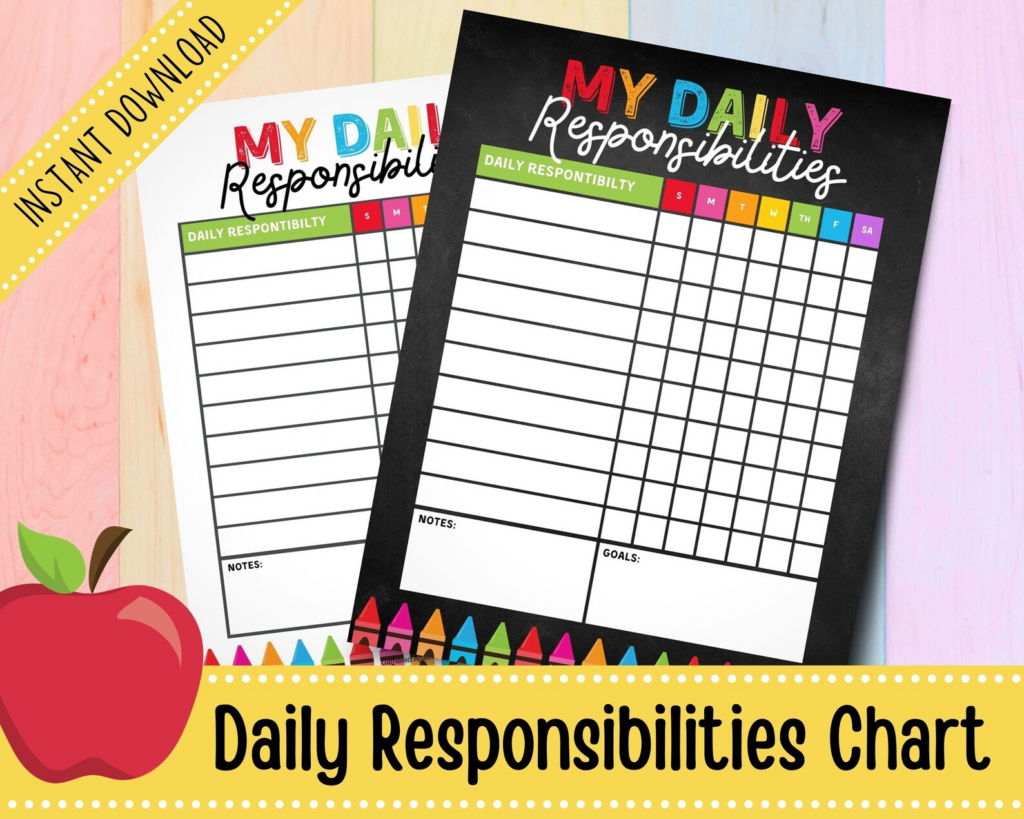Summer vacation is an excellent opportunity for kids to get out of the house and explore the world. However, it’s also a time when parents can end up with a lot of extra work around the house. Use this time as an opportunity to teach your kids about responsibility, and help prepare them for the future.
What Chores Can Kids Do?
Chores are an excellent way for kids to learn responsibility and develop a sense of ownership. But with so many different age groups and abilities, it can be tough to know where to start. So here is a list of age-appropriate chores for kids:
To help out, here are some age-appropriate chores for kids of all ages that can be done during summertime.

Ages 3 – 5
You might be surprised to find out that even kids as young as 3 can be started on chores. Obviously, things will be much more fundamental. You’re probably not going to have them following a schedule, but here are some chore ideas to get your little helper started early.
- Basic sweeping with a short broom. You can do the “sweeping game” where you create a square on the floor from painter’s tape and have your kid sweep dirt into the square.
- Toy pickup. Make this a habit after all playtimes.
- Bringing lightweight, non-breakable groceries into the house.
- Filling a pet’s food dish. You can also do water, but expect to clean up some spills.
- Basic dishwashing and drying of safe items such as plastic plates and cups.
- Combing a pet’s fur.
- Wiping up spills.

Ages 5 – 7
Ages 5 to 7 are where your kids will start to get a lot more helpful and independent. Expect mistakes and messes, but this is an excellent time for them to grow into their responsibilities.
- Sweeping and mopping. Again, don’t expect the highest quality job; it’s best to do it with your kids so they can learn proper techniques.
- Picking up toys and putting clothes and towels in the hamper.
- Basic bed making.
- Bringing in groceries.
- Filling a pet’s food and water dishes.
- Washing non-fragile dishes and silverware that isn’t sharp.
- Drying and putting dishes away.
- Walking pets that aren’t too large for them.
- Watering the garden
- Pulling weeds (be careful they pull only weeds and not your tomato plants!)
- Dust areas of the house they can reach safely.
- Basic laundry folding.
- Setting the table.
- Help with food preparation (have them help make peanut butter and jelly sandwiches and other simple foods).
- Help with garden work.

Ages 7-10
At ages 7 through 10, you’ll see the quality of their efforts, and you’ll notice that they need less supervision to complete their tasks. Many of the functions on my previous lists above can now be done almost entirely unaccompanied, and there are new tasks they can start to learn.
- Washing dishes
- Cleaning their room
- Cleaning sinks, toilets, and floors
- Polishing mirrors and windows
- Doing more of their own dirty laundry (although they’ll likely need assistance)
- Sweeping
- Vacuuming. Make sure your children understand what they should and shouldn’t vacuum up.
- Making simple foods
- Getting toothbrushes ready (especially if they have siblings)
- Helping get ready for bedtime (especially if they have siblings)
- Raking yard debris
- Watering plants
- Weeding around a garden or flowerbed
- Feeding and watering pets
- Picking up around the house
- Dusting
- Setting the dinner table.
- Getting drinks/snacks for siblings

Ages 10 – 13
Ages 10 through 13 are great years for your kids to pick up skills they’ll carry with them for the rest of their lives. Not only that, they’re now learning responsibilities they’ll need in their first jobs once they’re older teenagers.
- Water the garden.
- Pull weeds in the garden or yard.
- Pick up leaves and other yard debris.
- Help with garden work.
- Get the mail.
- Mow the lawn.
- Wash the car.
- Wash windows.
- Clean the pool.
- Clean the garage.
- Dust furniture.
- Vacuum.
- Take out the trash.
- Set and clear the table.
- Fold towels.
- Clean laundry.
- Clean the house.
- Put away groceries.
- Pick up toys.
- Sweep the house.
- Fold clothes.
- Clean their room.
- Change the sheets on their bed.
- Help prepare meals.
- Make sure the pets are fed and watered.

Chores List for Teens
As a parent, you may be wondering what chores are appropriate for your teenager to do at home. There are a variety of chores that can be assigned, depending on your child’s age and abilities. For younger teens, simple tasks like making their bed or taking out the trash can be an excellent way to start. As they age, they can take on more responsibility, such as doing the laundry or cooking dinner. No matter what chores you choose, give your teenager some guidance and supervision to ensure that they are correctly done. With your help, your teenager can learn how to be responsible and contribute to the household.
Indoor chores list for teens
Teenagers are probably not too thrilled about the idea of doing chores. But indoor chores are a necessary part of life, and they can actually be pretty helpful in teaching responsibility. Many teens view summer simply as a break from school and a chance to have fun, but it’s also an opportunity to prepare them for the real world.
Some good indoor chores for teenagers include:
- Vacuuming
- Dusting
- Sweeping
- Mopping
- Laundry
- Replace air filters
- Clean bathrooms and mirrors
- Cleaning baseboards
- Reorganizing the pantry
- Cooking meals
- Cleaning out the refrigerator
- Cleaning appliances
- Cleaning windows
- Polishing wood furniture
- Steam cleaning grout
- Steam cleaning floors
- And taking out the trash.
Teens can also help with meal prep, such as chopping vegetables or setting tables. If you have pets, your teen can be responsible for feeding them and cleaning up after them.
Whatever chores your teen does, make sure they do them regularly and to the best of their ability. Then, they can learn to keep a home clean and tidy with a little effort.
Outdoor chores list for teens
- Cut the grass
- Pull weeds
- Rake leaves
- Trim hedges
- Plant flowers
- Water the garden
- Clean the gutters
- Wash the car
- Vacuum out / detail vehicles
- Take out the trash
- Pressure washing
- Pruning trees
- Edging the lawn
- Clean the pool
- Clean the grill
- Wash house windows
- Touch up painting the house or a fence
- Help neighbors
- Bathing pets
Summer Daily Checklist
Having a daily list of summer chores you need to be completed around the house is essential. This can be accomplished with a checklist on a dry erase board or a printable chore chart. Your daily chore checklist should include a spot for each day of the week, along with each chore listed.
As your kid completes their daily tasks, they can check them off the list. A list will help them remember their daily responsibilities and get them into a daily routine. This is an excellent way of keeping your kids productive. As they acclimate, they’ll become very efficient at completing their chores. Use this as motivation to complete the household chores, and they’ll be left with plenty of time to enjoy their summer break too!
We have a chore checklist printable in our online shop ready for instant download and printing. Check it out here!
Chores Help Kids Learn and Grow
Giving kids chores around the house is more than just a way to get them to help out with the work. Chores teach kids responsibility, time management, and other essential life skills. They also give kids a sense of accomplishment and contribution to the family’s well-being.
Chores Teach Responsibility
One of the best ways to teach kids responsibility is to give them chores. Chores help kids learn to work independently and take pride in their work. They also learn to cooperate with others, as they often have to work together with family members to complete chores. Summer is a great time to start giving kids tasks, as they often have more free time during the summer months.
There are a variety of chores that can be assigned to kids, depending on their age and ability. For younger kids, simple tasks like setting the table or putting away toys can be helpful. Older kids can take on more responsibility, such as mowing the lawn or washing the car. No matter what chore you assign, be sure to give clear instructions and praise your child for a job well done.
Consider Safety Issues
Consider safety issues when assigning chores to your kids. For example, if you have a pool, you’ll want to ensure that your child knows how to swim and is aware of pool safety rules. You’ll also want to avoid assigning tasks that are too physically demanding or require using sharp objects. And, of course, you’ll want to ensure that your child is old enough and responsible enough to handle the chore you’re assigning. Considering these safety issues, you can help ensure that your child stays safe while completing their assigned duties.
Frequently Asked Questions
At what age should kids start doing chores?
Kids can begin doing some fundamental chores as young as 3. I’m speaking from experience here as a mother. I’m a firm believer in starting off early. After all, chores are just a word we use to describe tasks everyone needs to do to live everyday, modern lives. Moreover, your kids will eventually be adults. So it makes sense to get them started at a young age.
How can I get my kids to do their chores?
If you start kids off early enough, then they usually don’t need a lot of coaxing. However, if you’re just dropping these chores on a kid who hasn’t had to do much in the way of work, you’ll probably need to get creative.
This topic alone can be its own article, but here are my top tips:
- Turn what you can into a game.
- Try to make them into a “stakeholder.” For example, when I wanted to teach my kids gardening and have them help in the garden, I got each of them to grow their own plants from seed. Once they did that, they couldn’t wait to check on their plants!
- Use an incentive system! I don’t like paying kids to do chores, but I’m not above using an incentive system. We use one, but the most important thing to remember is to be consistent in your rewards.
- Tie the completion of chores to something they care about. For example, if they want to watch a specific movie, they must complete their duties first. Screen time is a sound bargaining chip when trying to get kids to do extra or just their weekly chores.
What are some benefits of kids doing chores?
Kids doing chores have many benefits, including developing a sense of responsibility, gaining independence, and becoming more self-sufficient. Chores also teach kids essential life skills such as time management, organization, and task prioritization. In addition, kids who do chores are often more successful in school and their future careers. Summer is a great time for kids to start chores, as they have more free time to complete them. By assigning simple tasks such as making the bed or taking out the trash, kids can learn the importance of caring for their belongings and keeping their living space clean.
Should teens do chores?
Absolutely! Teens are on the cusp of getting their first jobs. Chores help acclimate them to the idea of showing up, doing work, and people depending on them. These are essential life skills they must acquire to hold a job.
What are some benefits of teens doing chores?
There are many benefits to having teens do chores around the house. For one, it teaches them responsibility and gives them a sense of ownership over their home. Additionally, it can help them develop time management skills and learn essential life skills they’ll need as adults. Finally, doing chores can give teens a sense of pride and accomplishment.
Should I Pay My Kids to Do Chores?
There is no correct answer when it comes to whether or not you should pay your kids to do chores. Some parents feel that it is an excellent way to teach their children the value of work, while others believe it takes away from the intrinsic value of doing chores. Ultimately, the decision comes down to what you feel is best for your family. There are pros and cons to paying and not paying for chores, so it is essential to weigh your options before making a decision. If you decide to compensate your kids for chores, set clear expectations and rules to avoid any confusion or conflict.
If you want my honest opinion, the answer is you shouldn’t pay your kids to do chores. I know many parents feel that paying for assignments is a good way for kids to learn about working for money. I understand this thinking, but here is why I disagree with it:
- You already give a ton of value to your kids because they’re your kids! They get housing, food, drinks, entertainment, clothes, education, and other things for free. I’m not saying your kids should be paying you back, but it’s good to remind them what you already do for them.
- In my experience, once you make the commitment, there’s no putting that toothpaste back in the tube. Your kids will expect full pay, even if they did lackluster work.
- I feel that it undermines their role as contributing members of the family. The family is working together for the collective good. Once you change that motivation, I’m not confident you can get it back.
Do I Need A Chore Chart?
As a very experienced mother, the short answer is: yes! If you’re trying to decide whether or not to use a chore chart for your kids this summer, there are a few things to consider. First, consider what kinds of chores you would like your kids to do. Once you’ve decided what types of chores you want your kids to do, you can decide whether or not a chore chart is right for you.
If you think your kids will benefit from having a visual reminder of their chores, then a chore chart may be a good option. I believe that a chore chart reduces confusion and helps eliminate excuses. Other parents might have a different opinion, such as “I expect my kid to remember their obligations because that’s how they’ll need to function when they’re an adult too!”
Should I Create A Chore Schedule?
I suggest that you consider creating a chore schedule for your kids. Not only will it help them with their responsibility, but it will also give them a sense of ownership around the house. Plus, it’ll free up some of your time! When creating a chore schedule, be sure to include a variety of tasks that are appropriate for your child’s age and abilities. And don’t forget to involve them in the process – they’re more likely to stick to the schedule if they helped create it.
You can break the schedule up into morning and evening chores or any other way that fits your family’s lifestyle and schedule. This also helps eliminate some guesswork or excuses your kids might have. For example, “Oh, sorry, mom, I thought you wanted me to make my bed at night before I’m about to use it.”
Final Thoughts
Summer is the perfect time to get your kids involved in fun and productive summer chores. From making their own breakfast to washing the car, there are plenty of chores kids of all ages can help with. Not only will they be keeping busy during the summer months, but they’ll also be learning some valuable life skills. So, what are you waiting for? Get started on those summer chores!






